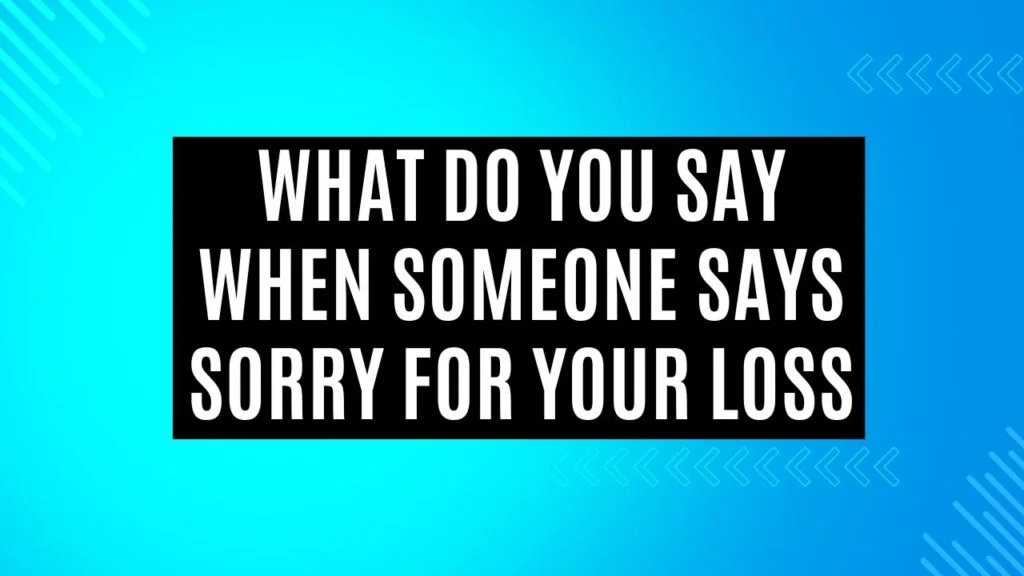What Do You Say When Someone Says Sorry for Your Loss? Losing a loved one is an emotionally overwhelming experience, and during this difficult time, people often extend their condolences to show support and care. A common phrase people use is “Sorry for your loss,” which is a simple yet heartfelt expression of sympathy. However, responding to this phrase can sometimes feel challenging when you’re grieving or don’t know exactly how to put your emotions into words.
What Do You Say When Someone Says Sorry for Your Loss?

In this article, we will explore how to gracefully respond when someone says, “Sorry for your loss.”
1. A Simple “Thank You”
When you are unsure of what to say, a simple and sincere “Thank you“ is often the best response. It acknowledges their sympathy without requiring you to say too much during a time when you might not feel like talking.
Example:
- “Thank you, I appreciate your kindness.”
Sometimes, less is more, especially when emotions are raw. People will understand that you may not be able to engage in a long conversation.
2. Express Gratitude for Their Support
If you feel up to it, you can express how much their support means to you. People often offer condolences because they want to help you feel less alone during a difficult time.
Example:
- “Thank you so much for being here for me. It means a lot.”
- “I really appreciate your words of comfort.”
Letting them know their presence or words matter can also strengthen the bond of care and support between you.
3. Share a Memory
If you feel comfortable, sharing a short memory or reflection about your loved one can be a heartfelt way to respond. This not only honors the person you lost but also invites the other person to connect with you on a more personal level.
Example:
- “Thank you. You know, [Name] was an incredible person. I’ll always remember how they used to make us laugh at family dinners.”
- “I appreciate that. [Name] loved this community, and I’m grateful for all the support.”
4. Acknowledge Their Compassion
It’s okay to simply acknowledge their effort to be there for you. Recognizing their kind words can create a sense of mutual understanding during difficult times.
Example:
- “That means a lot to me. Thank you for reaching out.”
- “I appreciate your compassion during this time.”
5. Let Them Know How You’re Coping (If Comfortable)
Sometimes, sharing a little about how you’re holding up can help create a meaningful exchange. This is particularly true when the person offering condolences is close to you.
Example:
- “Thank you. I’m taking it day by day, but having support like this really helps.”
- “It’s been hard, but I’m grateful for family and friends helping me through it.”
However, don’t feel pressured to share more than you’re ready to. It’s okay to set boundaries if you’re not ready to open up.
6. If Words Fail: A Nod or a Hug
Grief can make it difficult to speak, and that’s perfectly okay. Sometimes, a simple nod, a smile, or a hug (if appropriate) is all that’s needed to convey your gratitude for their sympathy. Most people will understand that words aren’t always necessary during such an emotional time.
What If You Don’t Want to Respond?
It’s important to remember that you are not obligated to respond if you don’t feel ready or able. Grief is deeply personal, and everyone processes it differently. If you need space, it’s okay to step away or let someone else respond on your behalf.
Example:
- “Thank you, but I need a little time to myself right now.”
Your emotional well-being comes first, so do what feels right for you.
Understanding Others’ Intentions
While the phrase “Sorry for your loss” might sound repetitive or even insufficient at times, it is important to remember that most people say it with genuine care and compassion. They may not always know the perfect words, but their intention is to show support and empathy.
Recognizing their effort can make it easier to respond, knowing they are simply trying to comfort you.
Final Thoughts
Responding when someone says, “Sorry for your loss,” doesn’t have to be complicated. A simple thank you, an acknowledgment of their support, or even sharing a memory can help you navigate these interactions gracefully. Ultimately, there is no right or wrong way to respond – what matters most is doing what feels natural and comfortable for you during your grieving process.
Remember, people offer condolences because they care about you and want to help you through a difficult time. Whether you respond with words, a smile, or a nod, your grief is your own, and it’s okay to take things at your own pace.
Truly a good deal of very good material!